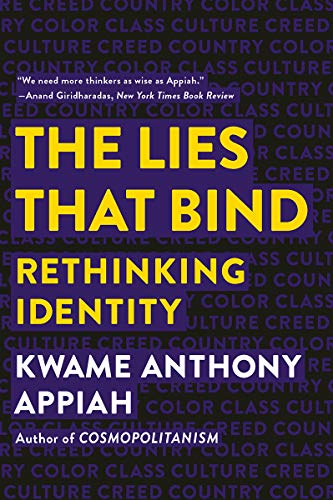
The Lies that Bind: Rethinking Identity

Evolutionary psychologists think these tendencies were once adaptive; they helped people survive by creating groups they could rely on to deal with the hazards of prehistoric life, including the existence of other groups competing for resources. Something like that is probably right. But whatever the explanation, it seems pretty clear that we’re
... See moreKwame Anthony Appiah • The Lies that Bind: Rethinking Identity
Labels came first, then, but essences followed fast. The boys didn’t develop opposing identities because they had different norms; they developed different norms because they had opposing identities. As far as identity goes, it turns out a lot can happen in four days.
Kwame Anthony Appiah • The Lies that Bind: Rethinking Identity
In each of my five test cases, we fall into an error I’ll describe in the first chapter: of supposing that at the core of each identity there is some deep similarity that binds people of that identity together. Not true, I say; not true over and over again.
Kwame Anthony Appiah • The Lies that Bind: Rethinking Identity
Having an identity doesn’t, by itself, authorize you to speak on behalf of everyone of that identity.
Kwame Anthony Appiah • The Lies that Bind: Rethinking Identity
In sum, identities come, first, with labels and ideas about why and to whom they should be applied. Second, your identity shapes your thoughts about how you should behave; and, third, it affects the way other people treat you. Finally, all these dimensions of identity are contestable, always up for dispute: who’s in, what they’re like, how they
... See moreKwame Anthony Appiah • The Lies that Bind: Rethinking Identity
My main message about the five forms of identity that take us from Chapter Two to Chapter Six is, in effect, that we are living with the legacies of ways of thinking that took their modern shape in the nineteenth century, and that it is high time to subject them to the best thinking of the twenty-first.
Kwame Anthony Appiah • The Lies that Bind: Rethinking Identity
I can get you to think of people—even a group of diverse-looking people of both sexes and all ages—as a kind, by making generic remarks about them. And you’re more likely to accept a generic claim about a group if what it says is something negative or worrying. We humans are more likely, then, to essentialize groups about which we have negative
... See moreKwame Anthony Appiah • The Lies that Bind: Rethinking Identity
however much identity bedevils us, we cannot do without it. You’ll recall the old joke. A man goes to see a psychiatrist.
Kwame Anthony Appiah • The Lies that Bind: Rethinking Identity
Did he find four separating forces between his temporary guest and him? Name, age, race, creed. . . . What, reduced to their simplest reciprocal form, were Bloom’s thoughts about Stephen’s thoughts about Bloom and about Stephen’s thoughts about Bloom’s thoughts about Stephen? He thought that he thought that he was a jew whereas he knew that he knew
... See more